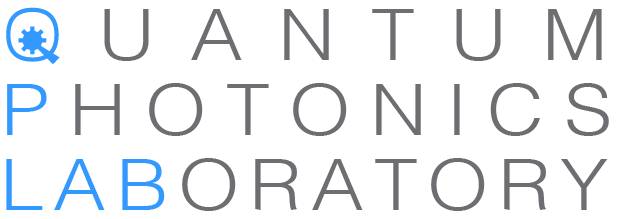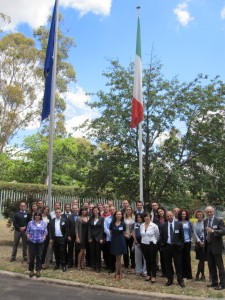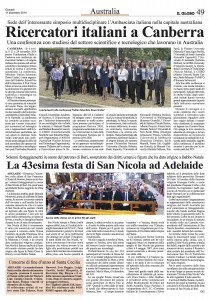Quantum state transfer published in Nature Communications
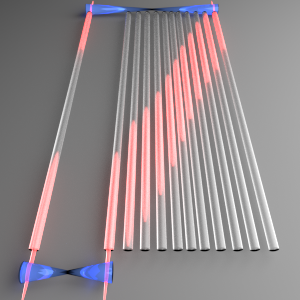 In an international collaboration between the Quantum Photonics Laboratory at RMIT, the Politecnico di Milano and the South University of Science and Technology of China, we have demonstrated, for the first time the perfect state transfer of an entangled quantum bit (qubit) on an integrated photonic device.
In an international collaboration between the Quantum Photonics Laboratory at RMIT, the Politecnico di Milano and the South University of Science and Technology of China, we have demonstrated, for the first time the perfect state transfer of an entangled quantum bit (qubit) on an integrated photonic device.
The ability of information transfer is at the heart of every information processing system, from global satellite communication to biological neural networks. Likewise, quantum technologies require high fidelity routing of quantum information between different locations of a quantum processor and quantum communication nodes. Due to the long-standing challenge of preserving extremely fragile quantum correlation, despite numerous theoretical proposals, to date, the perfect state transfer protocol has not been experimentally realized on quantum bits of information. In this work we report the first demonstration of perfect state transfer protocol.
Using the state-of-the-art three-dimensional direct-write waveguide technology, we fabricated an integrated waveguide array with a specific design, showing the capability of high fidelity transfer of quantum states.
We anticipate that our realisation of the perfect state transfer protocol has direct applications in many areas, including quantum transport, quantum simulation, entanglement preparation and distribution, and qubit interconnection for quantum computation. These applications may induce fundamental changes in the way we design the infrastructure of the next-generation quantum information processing devices, saving more space and allowing more automation.
Congratulations to Akib for presenting at the FameLab NSW semi-final
Next up, Akib Karim from @RMIT introduces us to quantum field theory and asks them to do a Mexican wave! ?? #FameLab pic.twitter.com/j6I1lTptrR
— British Council (@auBritish) April 7, 2016
Welcome to the new members of QPL
Today Dr Andreas Boes joins QPL as a postdoctoral fellow and Akib Karim and Inna Krasnokutska start their PhD on quantum photonics.
Welcome everyone!
Scholarships and Awards Success
Many congratulations to our students who have been awarded several Scholarships and Prizes:
Long David was awarded the Levey Scholarship No 1 and the Smith Prize in Experimental Physics
Angus Johnson was awarded the University of Sydney Physics Foundation Scholarship No 1
Alex Hung was awarded the School of Physics – JSM Scholarship No 2 and the Slade Prize in Intermediate Physics Practical
Kehuan Shi was awarded the University of Sydney Physics Foundation Scholarship No 2
Akib Karim was awarded the School of Physics Honours Scholarship
Meeting of Italian Scientists Down Under
On 27-28 November 2014, the Italian Embassy held a meeting of researchers in the science and technology area, of Italian origin.
Press release, article on Australian Science, and program
Welcome to the new members of QPL
Today Robert Chapman starts his PhD on quantum photonics. He has awarded a very competitive University of Sydney’s International Postgraduate Research Scholarship. Congratulations Rob! Frank Paino joins our group as Honours student. David Merrick Long, Ryan Thomas and Tzu-Heng Hung (Alex) join QPL as part of the talented student program.
Welcome everyone!
Quantum variational algorithm published in Nature Communications
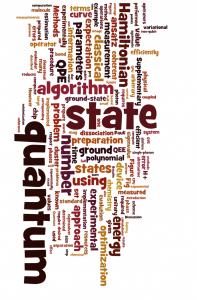 An international team of researchers from the Universities of Sydney, Bristol, Harvard and Haverford College have demonstrated a new quantum algorithm that dramatically reduces the requirements for quantum resources. Using a small-scale reconfigurable photonic quantum processor they successfully calculated some important molecular properties of the Helium Hydride molecule. In the future, much larger molecules will be studied using with only a few tens of qubits, in contract to the millions or billions of quantum bits required today.
An international team of researchers from the Universities of Sydney, Bristol, Harvard and Haverford College have demonstrated a new quantum algorithm that dramatically reduces the requirements for quantum resources. Using a small-scale reconfigurable photonic quantum processor they successfully calculated some important molecular properties of the Helium Hydride molecule. In the future, much larger molecules will be studied using with only a few tens of qubits, in contract to the millions or billions of quantum bits required today.
This approach is likely to serve as the blueprint for quantum eigensolvers and could lead to the first practical quantum enhanced calculation long before previously anticipated.
